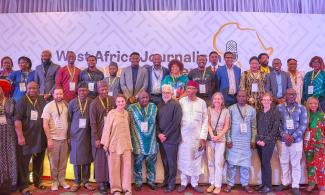
Media professionals and stakeholders have stressed the importance of innovation and collaboration between journalism practitioners to promote ethical reporting, media literacy and sustainability in the media sector.
The experts also urged for collaboration between journalism practitioners and educators in tertiary institutions across West Africa to enhance the training of future journalists.
The call was made at the inaugural West Africa Journalism Innovation Conference (WAJIC) organized by the Centre for Journalism, Innovation, and Development (CJID). The conference, themed "Accountability Journalism: Nurturing Innovation for a Sustainable Future”, brought together experts in journalism practice and academia, advocating for increased collaboration between journalism practitioners and educators in tertiary institutions across West Africa.
The #WAJIC23 conference highlighted the pressing need for West African journalists to embrace innovation and foster collaboration to enhance productivity, media sustainability, and the promotion of democratic values in the region.
During the conference, Richard Gingras, Vice President (News) at Google, delivered the keynote address, highlighting the significance of technology and generative AI in the domain of news, particularly local news.
Gingras urged journalists to be more constructive and creative in their reporting to maintain the media's relevance. He emphasized the relatively low consumption of serious news in society and stressed the importance of using AI tools to meet audience needs effectively.
Gingras also highlighted the value of enriching communities through reporting that addresses their overall needs, fostering accountability journalism.
He stressed the importance of breaking the silos within society to ensure vital journalism reaches a broader audience.
"The scale and complexity of the information space will expand further with machine learning and generative language models. The technology is upon us. It has been for a long time.
“There are many language models, including many from sources we are not even aware of. The need and the challenge to develop better models to generate constructive content is important,” he added.
Kole Shettima, the Africa Director of the MacArthur Foundation, expressed the organization's support for journalism in Nigeria while emphasizing the importance of multiple revenue sources for independent media to thrive.
He also underscored the critical role of technology and innovation in keeping up with global developments.
“We know that money from some sources is very corrupt, so the media needs multiple sources of revenue to keep afloat. We support accountability journalism, which must be financed by multiple sources of revenue. Independent media is critical for democracy to survive; the reason is also why we support independent media,” he said.
Joshua Olufemi, Founder, and Publisher of Dataphyte, advocated for journalists to embrace AI tools to drive the purpose of their work and not to fear technology. He urged journalists to explore how these tools could satisfy the audience's needs.
"We must acknowledge the significance of technology as a driving force for our work and a means to overcome challenges,” Olufemi said.
Prof Audrey Gadzekpo, a professor from the University of Ghana, emphasized the importance of researching audience preferences and behaviours due to their diversity.
She also highlighted how the emergence of the internet has raised crucial issues like funding, technology, press freedom, credibility, and safety, necessitating investment in research tailored to the region's specific needs for adopting these technologies.
She added that there is a need to provide mentorship for students in tertiary institutions and empower them to research innovative ways to adopt technologies across media outlets.
Rosemary Egabor-Afolahan, Head of Commercials at News Central TV, stressed the importance of partnerships with independent content creators for media sustainability.
She emphasized understanding the target audience's consumption behaviour, co-creating content with them, and sharing revenue as crucial elements in achieving sustainability.
However, concerns were raised by Mr. Dapo Olorunyomi, Premium Times Publisher and Chief Executive Officer of CJID, about the troubled state of journalism in the region, with a crisis in its business model and declining audience trust.
He viewed the conference as an opportunity for innovation in content production, distribution, and financing to address these challenges effectively.
“Innovation is a pathway to the challenges of renewal we seek, and if we ever make West Africa a space and zone of good governance, tolerance and liveable, our journalism must wake up to the test of an effective response to realities of fragile states, the epidemic of corruption, information and climate crises, complexities of technology and the absence of sub-national mechanisms of accountability like professional media at state and local council levels,” Olorunyomi said.
As #WAJIC23 continues to inspire West African journalists to innovate and collaborate, the conference's outcomes are expected to drive improved productivity, media sustainability, and a stronger foundation for journalism in the region.